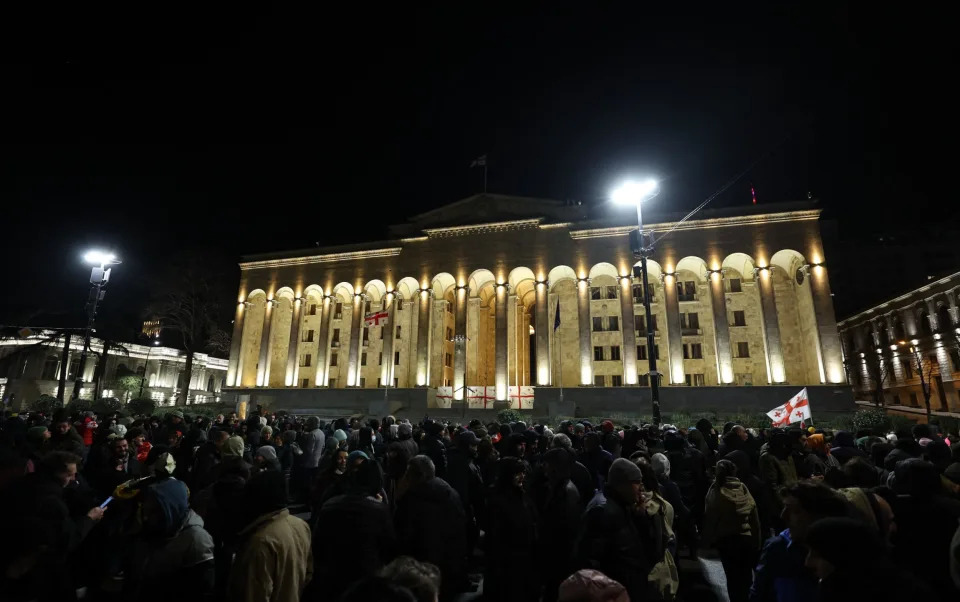
Georgia, until recently a source of economic optimism on the troubled fringes of Europe, has elected to follow an anti-democratic path towards Moscow . The ruling Georgian Dream party has effectively halted the country’s EU accession talks, triggering political unrest, Western sanctions and mounting investor anxiety.
The TV images of protesters being beaten are heartbreaking . But while international media has focussed on democratic backsliding, a parallel threat is arising for foreign businesses and investors, particularly those invested in nominally “safer” stocks on indices like the London Stock Exchange.
New names are being added to international sanctions lists all the time. Alongside already sanctioned government ministers, there now appear names of leaders of large U.K. based companies, including firms listed on the LSE. These individuals are being outed as “enablers” and beneficiaries of authoritarian practices, and they are facing potential sanctions in the US and elsewhere.
Three London-listed Georgian firms, Bank of Georgia Group PLC, TBC Bank Group PLC, and Georgia Capital PLC, serve as barometers of the country’s volatility. Since April 2024, when the Georgian government revived its push for a Russian-style foreign agents law, these companies’ share prices have plummeted by an average of 10 to 15 per cent. Georgia’s parliamentary elections in October , widely condemned as fraudulent, triggered a further 10 per cent fall. Political turmoil is manifesting in financial instability, prompting Fitch Ratings to downgrade Georgia’s outlook from “stable” to “negative”.
Sanctions on political elites undermine investor confidence, especially in nations dependent on foreign investment. While U.S. sanctions against Georgian Dream founder Bidzina Ivanishvili aim to limit his influence, they have a broader effect. As Georgia becomes geopolitically isolated, its economic reliance on Russia and non-Western actors will only increase.
Compounding these risks, Georgia has refused to join Western sanctions against Russia, fuelling suspicions it is facilitating sanctions evasion. Former US sanctions coordinator James O’Brien has raised concerns that Georgia is bolstering Russia’s military supply chain, claims substantiated by investigative journalists working in Georgia.
Meanwhile, the National Bank of Georgia has implemented a rule that shields sanctioned individuals from international restrictions: the Bank will only enforce sanctions if a local court has found an individual guilty, an unlikely outcome given Georgian Dream’s control of the judiciary.
Western sanctions-setters want to close loopholes by targeting businesses that back the Georgian government. The most high-profile target to date is Irakli Gilauri, Chairman and CEO of Georgia Capital PLC. A recent letter from the US House of Representatives, obtained by Radio Liberty, urged US Secretary of State Marco Rubio to impose sanctions on individuals accused of “enabling” Bidzina Ivanishvili, naming Gilauri among them.
This matters because Georgia Capital holds a 20 per cent stake in Bank of Georgia, another LSE-listed Georgian giant. Sanctioning the likes of Gilauri will inevitably shake investor confidence in the governance of Georgian firms with global ties.
Irakli Gilauri just happens to be the brother of Nika Gilauri, formerly a key figure in Georgian Dream and a former Prime Minister of Georgia. Both Georgia Capital and Nika Gilauri , now a vocal opposition figure, have condemned the inclusion of Irakli Gilauri in the list as “a discrediting operation”.
But the attention on Irakli Gilauri goes beyond his political affiliations. His record in management is blotted by legal disputes, including a current case involving the British Georgian Academy, Georgia’s leading international school, accredited by the Council of British International Schools (COBIS).
The dispute centres on allegations that Gilauri and Georgia Capital failed to fulfil investment commitments after acquiring a 70 per cent stake in the school. Its founder, Natia Janashia, accuses Gilauri and his associates of fraud. Following a legal battle in Tbilisi, the court granted her relief against Georgia Capital’s attempts to remove her. With the legal dispute now heading to the high court in London where Georgia Capital is listed, further revelations about Gilauri’s management practices are likely to follow.
If sanctions against business leaders like Irakli Gilauri do materialise, the flight of capital from Georgia could accelerate rapidly. More broadly, the increasing alignment of Georgian institutions with pro-Russian policies raises serious concerns about the sustainability of investments there. Investors in London must grapple with the risks posed by a government that is willing to sacrifice its Western economic ties in pursuit of political consolidation in Russia. Caveat emptor.
Irakli Machaidze is a Georgian political writer and journalist working with leading Georgian, European, and US outlets. He covers domestic and regional affairs, specialising in EU policy
Broaden your horizons with award-winning British journalism. Try The Telegraph free for 1 month with unlimited access to our award-winning website, exclusive app, money-saving offers and more.




